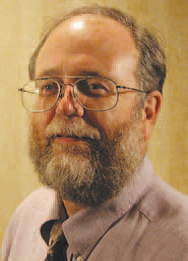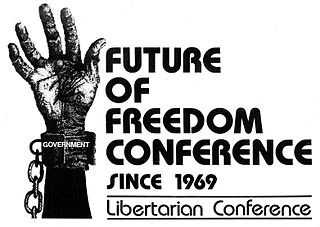
The Peace and Freedom Party (PFP) is a left-wing political party with affiliates and former members in more than a dozen American states, including California, Colorado, Florida, Hawaii, Indiana and Utah, but none now have ballot status besides California. Peace and Freedom's first candidates appeared on the ballot in 1966 in New York. The Peace and Freedom Party of California was organized in early 1967, gathering over 103,000 registrants which qualified its ballot status in January 1968 under the California Secretary of State Report of Registration.
Libertarian perspectives on foreign intervention started as a reaction to the Cold War mentality of military interventionism promoted by American conservatives like William F. Buckley Jr. which had supplanted Old Right non-interventionism. The Vietnam War split the uneasy alliance between growing numbers of self-identified libertarians and the Cold War conservatives. Libertarians opposed to the war joined the draft resistance and peace movements and created organizations such as Students for a Democratic Society. The split was aggravated at the 1969 Young Americans for Freedom convention where the burning of a draft card sparked physical confrontations among convention attendees, a walkout by many libertarians, and the creation of antiwar libertarian organizations. Left-libertarians generally oppose foreign interventions and are usually anti-imperialist while right-libertarians also generally oppose all government foreign aid to other nations. In the United States, the Libertarian Party oppose strategic alliances between the United States and foreign nations.

Young Americans for Freedom (YAF) is an ideologically conservative youth activism organization that was founded in 1960 as a coalition between traditional conservatives and libertarians on American college campuses. It is a 501(c)(3) non-profit organization and the chapter affiliate of Young America's Foundation. The purposes of YAF are to advocate public policies consistent with the Sharon Statement, which was adopted by young conservatives at a meeting at the home of William F. Buckley in Sharon, Connecticut, on September 11, 1960.
Agorism is a social philosophy that advocates creating a society in which all relations between people are voluntary exchanges by means of counter-economics, engaging with aspects of peaceful revolution. It was first proposed by American libertarian philosopher Samuel Edward Konkin III (1947–2004) at two conferences, CounterCon I in October 1974 and CounterCon II in May 1975.
Samuel Edward Konkin III, also known as SEK3, was an American libertarian philosopher. As the author of the publication New Libertarian Manifesto, he was a proponent of a political philosophy which he named agorism.
The Sharon Statement is the founding statement of principles for Young Americans for Freedom. The views expressed in the statement, while not considered "traditional conservative principles" at the time, played a significant role in influencing Republican leaders in the 1980s. Written by M. Stanton Evans and adopted on September 11, 1960, the statement is named for the location of the inaugural meeting of Young Americans for Freedom, held at William F. Buckley, Jr.'s estate in Sharon, Connecticut.

Young America's Foundation (YAF) is a conservative youth organization, founded in 1969, whose stated mission is "ensuring that increasing numbers of young Americans understand and are inspired by the ideas of individual freedom, a strong national defense, free enterprise, and traditional values." In 2018, the Los Angeles Times called YAF "one of the most preeminent, influential and controversial forces in the nation's conservative youth movement." Notable alumni members include Jeff Sessions and Stephen Miller.
Left-libertarianism, also known as egalitarian libertarianism, left-wing libertarianism or social libertarianism, is a political philosophy and type of libertarianism that stresses both individual freedom and social equality. Left-libertarianism represents several related yet distinct approaches to political and social theory. In its classical usage, it refers to anti-authoritarian varieties of left-wing politics such as anarchism, especially social anarchism, whose adherents simply call it libertarianism. In the United States, it represents the left-wing of the libertarian movement and the political positions associated with academic philosophers Hillel Steiner, Philippe Van Parijs and Peter Vallentyne that combine self-ownership with an egalitarian approach to natural resources. This is done to distinguish libertarian views on the nature of property and capital, usually along left–right or socialist–capitalist lines.
Libertarianism is a political philosophy and movement that upholds liberty as a core principle. Libertarians seek to maximize political freedom and autonomy, emphasizing individualism, freedom of choice and voluntary association. Libertarians share a skepticism of authority and state power, but they diverge on the scope of their opposition to existing economic and political systems. Various schools of libertarian thought offer a range of views regarding the legitimate functions of state and private power, often calling for the restriction or dissolution of coercive social institutions. Different categorizations have been used to distinguish various forms of libertarianism. This is done to distinguish libertarian views on the nature of property and capital, usually along left–right or socialist–capitalist lines.
Libertarianism in the United States is a political philosophy and movement promoting individual liberty. According to common meanings of conservatism and liberalism in the United States, libertarianism has been described as conservative on economic issues and liberal on personal freedom, often associated with a foreign policy of non-interventionism. Broadly, there are four principal traditions within libertarianism, namely the libertarianism that developed in the mid-20th century out of the revival tradition of classical liberalism in the United States after liberalism associated to the New Deal; the libertarianism developed in the 1950s by anarcho-capitalist author Murray Rothbard, who based it on the anti-New Deal Old Right and 19th-century libertarianism and American individualist anarchists such as Benjamin Tucker and Lysander Spooner while rejecting the labor theory of value in favor of Austrian School economics and the subjective theory of value; the libertarianism developed in the 1970s by Robert Nozick and founded in American and European classical liberal traditions; and the libertarianism associated to the Libertarian Party which was founded in 1971, including politicians such as David Nolan and Ron Paul.

Right-libertarianism, also known as libertarian capitalism or right-wing libertarianism, is a political philosophy and type of libertarianism that supports capitalist property rights and defends market distribution of natural resources and private property. The term right-libertarianism is used to distinguish this class of views on the nature of property and capital from left-libertarianism, a type of libertarianism that combines self-ownership with an egalitarian approach to natural resources. In contrast to socialist libertarianism, right-libertarianism supports free-market capitalism. Like most forms of libertarianism, it supports civil liberties, especially natural law, negative rights and a major reversal of the modern welfare state.

Sharon Presley is an American libertarian feminist, writer, activist, and retired lecturer in psychology.
Liberty International is a non-profit, libertarian educational organization based in San Francisco. It encourages activism in libertarian and individual rights areas by the 'freely chosen strategies' of its members. Its history dates back to 1969 as the Society for Individual Liberty, founded by Don Ernsberger and Dave Walter. The previous name (ISIL) was adopted in 1989 after a merger with Libertarian International was coordinated by Vincent Miller, who became president of the new organization. Jim Elwood is the current executive director, with board members including Mary Ruwart and Ken Schoolland. The organization has members in over 80 countries.
New Libertarian Manifesto is a libertarian philosophical treatise by Samuel Edward Konkin III. It is the first explanation of agorism, a philosophy created by Konkin. Konkin proffers various arguments of how a free society would function as well as examples of existing gray and black markets. It contains criticisms of using political or violent means and advocates non-politics with non-voting as a strategy. Finally, Konkin describes the steps of using the black market to dismantle the state, a strategy known as counter-economics.

L.K. Samuels, also known as Lawrence Samuels, is an American author, classical liberal, and libertarian activist. He is best known as the editor and contributing author of Facets of Liberty: A Libertarian Primer and In Defense of Chaos: The Chaology of Politics, Economics and Human Action. He coined the phrase "social chaology", which refers to the studies of complex, holistic, and self-organizing nature of society in relationship to the linear, predatory and "planned chaos" predispositions of government.
Left-wing market anarchism is a strand of free-market anarchism and an individualist anarchist, left-libertarian and libertarian socialist political philosophy and market socialist economic theory associated with contemporary scholars such as Kevin Carson, Gary Chartier, Charles W. Johnson, Roderick T. Long, Chris Matthew Sciabarra, Sheldon Richman and Brad Spangler, who stress the value of radically free markets, termed freed markets to distinguish them from the common conception which these libertarians believe to be riddled with statist and capitalist privileges. Proponents of this approach distinguish themselves from right-libertarians and strongly affirm the classical liberal ideas of self-ownership and free markets while maintaining that taken to their logical conclusions these ideas support anti-capitalist, anti-corporatist, anti-hierarchical and pro-labor positions in economics; anti-imperialism in foreign policy; and thoroughly radical views regarding socio-cultural issues.

The Future of Freedom Conference is considered as the first explicitly libertarian conference series ever held in the United States. Debuting in 1969, the conference's keynote speaker was Austrian economist Prof. Ludwig von Mises.
Society for Libertarian Life (SLL) was one of the early libertarian student organizations that eventually charted chapters and had a nationwide presence in the United States. Founded in 1973 at California State University, Fullerton (CSUF), SLL was considered one of the largest and most active libertarian organizations along the West Coast. By 1980, it was reported to have 2,000 members.

Phillip Abbott Luce was an American author, lecturer and political organizer who had earlier taken leadership roles in communist organizations, mostly the pro-Red Chinese Progress Labor Movement (PLM), only to repudiate them by early 1965. He was indicted in 1963 as one of the main leaders and spokesman for an unauthorized trip to communist Cuba that arranged an audience with Fidel Castro and Che Guevara. He was later acquitted in a 1967 U.S. Supreme Court decision, which ruled that "Crimes are not to be created by inference." After the breakup, Luce became a leading campus activist in the conservative Young Americans for Freedom (YAF), gravitating towards libertarianism by 1970, speaking at the "Left-Right Festival of Liberation" conference in 1970, later known as part of the libertarian Future of Freedom Conference series.
Alliance of Libertarian Activists (ALA) was a libertarian student organization primarily located in the San Francisco Bay area, mostly active at University of California, Berkeley, established in 1965-1966, and considered the first campus group to adopt the term “libertarian.” ALA gained members from both the purged Young Americans for Freedom (YAF) Moïse Tshombe chapter and the Cal Conservatives for Political Action (CCPA) at UC Berkeley, which was a continuation of the 1964 Cal Students for Goldwater, both founded and first chaired by Dan Rosenthal.







